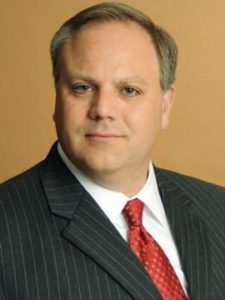Today’s broadcast media often seems able to handle only one story at a time. Big cable networks fixate on one event, sometimes for days, until the next event displaces it. Round-the-clock coverage of elections, random shootings, royal weddings, or presidential tweets leave us wondering if anything else is happening anywhere.
Similarly, the environmental press hangs up on one story to the exclusion of other news, often for several days, frequently with the same quotes from the same people reaching the same conclusions. Witness the rash of recent articles alleging “conflicts of interest” among Trump Administration appointees – mostly focused on one official.
 Deputy Interior Secretary David Berhardt, a Western Slope native, is but one of hundreds of high-level Administration appointees, all of whom previously held other jobs. Yet many articles single him out for this particular accusation. That’s not because he alone formerly represented people with interests involving his Department. It’s simple journalistic laziness; one reporter “breaks” a story, and many others repeat it without needing much additional research.
Deputy Interior Secretary David Berhardt, a Western Slope native, is but one of hundreds of high-level Administration appointees, all of whom previously held other jobs. Yet many articles single him out for this particular accusation. That’s not because he alone formerly represented people with interests involving his Department. It’s simple journalistic laziness; one reporter “breaks” a story, and many others repeat it without needing much additional research.
Enviro-activist Congressman Jared Huffman (D-CA) called Bernhardt “a walking conflict of interest,” while Senator Elizabeth Warren (D-MA) used the word “corruption” and called him “the ultimate DC swamp creature.” Dozens of other accusers have piled on, trying to create a big scandal. The charge is that Bernhardt “has ties” to industry groups and/or lobbyists – shocking, probably unprecedented! Why, surely no other Interior Department official ever had “ties” to outside groups with natural resources interests. Right?
The question is absurd. Do we expect the Department of Health and Human Services to be led by people who never worked for hospitals or social services? Should lawyers be barred from Justice Department positions? No union employee can work at Labor, nor businessman at Commerce?
Rifle native David Bernhardt is an accomplished attorney with experience on Capitol Hill, in private practice, and as Interior Department solicitor. Even his critics, such as former Clinton/Obama appointee Jim Lyons, acknowledge his nearly unparalleled “wealth of knowledge and experience.” So what is the problem? Simply put, while practicing law, his firm’s clients included several water districts and energy companies. That was no secret when he was nominated, and in Senate confirmation hearings he promised to recuse himself from decisions affecting former clients. He has done so faithfully, even carrying a list of those recusals in his pocket. Even that precaution is harshly criticized, one article shrieking that he “has so many conflicts of interest he has a carry a card to remember them all!” Perhaps critics would prefer he forget, so they can catch him in an ethical mistake – which has not happened. Perhaps they should ask whether Interior officials in other Administrations have been so scrupulous about avoiding potential conflicts.
Jim Lyons, for example, oversaw the Forest Service under Clinton, then served as a top Interior official under Obama. Before, between, and after those appointments, he worked at the Yale School of Forestry (which gets money from the Forest Service), Defenders of Wildlife (whose entire agenda is intertwined with the Interior Department) and numerous other environmental groups. Should we hold his 30 years of experience against him, disqualifying him from any future Interior appointment?
One of Berhardt’s predecessors, David Hayes, who served both Clinton and Obama, also worked at environmental organizations (World Wildlife Fund, Woods Institute, and others) and practiced law, representing clients with Interior Department interests. He handled those in the same appropriate manner as Bernhardt, but that was apparently not considered newsworthy. Not a single news story ever shrieked about how David Hayes was a “walking conflict of interest.” Another of Bernhardt’s predecessors, Michael Connor, still practices environmental law, including working for clients affected by Interior Department issues. Former Secretary Sally Jewell was the CEO of REI, whose outdoor equipment sales are closely tied to public lands issues. None of them were ever similarly accused.
The Nature Conservancy, League of Conservation Voters, Defenders of Wildlife, Environmental Defense Fund, EarthJustice, Center for Biological Diversity, Wilderness Society, Trout Unlimited, Natural Resources Defense Council, and many others, all have leaders who were also appointees at Interior, EPA, USDA, and DOE.
You see, in Washington there are two governments: the one in power and the one in exile. Whenever elections change control of the White House, one group leaves government and goes back to lobbying, the other comes back into government. It has always been that way, so every Administration appoints people with a wealth of experience – on one side or the other.
Nobody really wants people without experience. One side is just angry that the other side is in charge for a while. They ought to lighten up on these disingenuous accusations, though. Dave Berhardt is an honorable guy, doing his best to implement the President’s agenda, as voter have every right to expect.
An edited version of this column first appeared in the Grand Junction Daily Sentinel November 30, 2018.




Comments on this entry are closed.